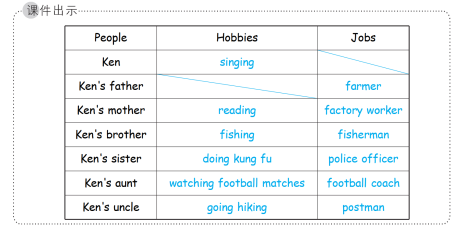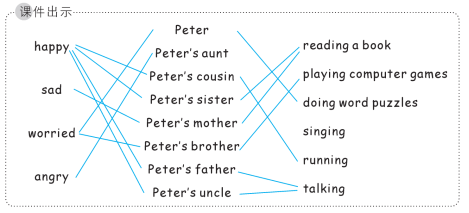人教pep六上英语 Recycle 2 The first period 第一课时 教案
Recycle 2
![]()
教材分析 | 本单元的主要学习内容是通过故事、活动等形式复习和巩固第4~6单元的核心词汇及句型 |
教学目标 | 知识与能力目标: ·能够听、说、读、写并在实际情景中运用第4~6单元的核心句型 ·能够在情景中运用句型“—What are…’s hobbies? —He / She likes + v-ing.”等简单句来询问和描述某人的喜好 ·能够在情景中正确运用句型“—Does he/she…? —Yes, he/she does./No, he/she doesn’t.”询问某人是否做什么 ·能够在情景中运用句型“—What does he/she do? —He / She is…”询问并回答某人的职业 ·能够在情景中运用句型“Where does he work?”和“How does he go to work?”询问了解某人的工作地点和出行方式 ·能够运用句型“How does…feel?”询问某人的情绪并使用表示情绪的形容词来描述情绪 ·能够运用句型“You should…”和“Don’t…”安慰他人和提供建议 ·能使用句型“What’s wrong?”询问他人状况 ·能够听、说、读、写第4~6单元有关业余爱好、职业、情绪的单词或词组 ·能够在有意义的语境中运用上述单词或词组 ·知道英语句子有不同语调,并能根据正确的语调朗读不同类型的句子 ·知道英语句子中有连读、失去爆破,并能正确朗读含有以上现象的句子 ·知道句子有重音,并能正确读出句子的重音 情感态度、文化意识、学习策略目标: ·从不同视角认识职业,明白从事某些职业的基本条件,尊重每种职业,构思自己的职业理想 ·了解诚实是最宝贵的品质 ·了解英语故事的基本构成要素 |
课时安排 | 第一课时: Page 66 & Page 67 第二课时: Page 68 & Page 69 |
The first period(第一课时)
Page 66 & Page 67 ![]()
▶教学内容与目标
课时教学内容 | 课时教学目标 |
Page 66 | ·能够通过观察图片,听懂情景对话 ·能够在情景中运用句型“—What does he/she do? —He / She is…”询问并回答某人的职业 ·能够运用句型“—What are…’s hobbies? —He / She likes + v-ing.”来询问和描述某人的喜好. |
Page 67 | ·能够运用句型“How does…feel?”询问某人的情绪 ·能够使用表示情绪的形容词描述情绪 ·能够运用句型“You should…”“Don’t…”安慰他人和提供建议 ·能够使用句型“What’s wrong?”询问他人状况 |
▶教学重点
能够在情景中复习和运用第4~6单元的核心句型。
▶教学难点
能够在情景中合理运用所学句型。
▶教学准备
PPT课件、课文录音等。
 ▶教学过程
▶教学过程
1
Step 1: Pre-learning
1. Greetings.
2. Brainstorm.
Show some pictures of jobs on the PPT. (课件出示:一些职业照片,附上单词或词组,如:teacher, postman, fisherman, fireman, coach, scientist, pilot, businessman, factory worker, farmer, police officer等) Help students review the words or the phrases of jobs.
3. A guessing game.
The teacher says some sentences to describe the jobs. And students try to guess the jobs.
T:He works at sea. He likes fishing. What does he do?
S1:He’s a fisherman.
T:She works in a factory. What does she do?
S2:She’s a factory worker.
…
Ask several students to make riddles about jobs. Then say the riddles to the class. The other students try to guess the jobs.
4. Read and do.
Show some words or phrases on the PPT. (课件出示:单词或词组,如:happy, angry, sad, afraid, ill, worried, see a doctor, do more exercise, take a deep breath, wear warm clothes, talk, run, read books, play computer games, sing song等)
Ask students to make facial expressions or do actions while reading the words or the phrases. Help students review the words of the feelings and some activities.
5. I do, you say.
Ask some students to do actions to the class one by one. One student asks, “What’s his/her hobby?” The other students try to guess.
Step 2: While-learning
 P66
P66
1. Understand the background knowledge.
Students read the background knowledge by themselves first.
Then the teacher introduces the background knowledge.
T:Peter’s family are going to visit Ken’s family in another town. Peter’s father is talking about them.
2. Guess the jobs.
Students work in groups to guess the jobs of Ken’s family.
3. Listen and fill in the blanks.
(1)Play the recording. (课件出示:教材P66音频) Students listen to the recording and try to write down their jobs on the lines.
(2)The teacher and students check the answers together. (课件出示:教材P66 第一题答案)
Praise the students who write the answers right.
4. Listen again. Write down the hobbies for the people.
(1)Play the recording again. (课件出示:教材P66音频) Students listen to the recording and try to write down the hobbies for the people on the lines.
(2)The teacher and students check the answers together. (课件出示:教材P66 第二题答案)
Praise the students who write the answers right.
5. Finish the chart.
Show a chart to students. Ask them to fill in the blanks according to the listening text.

6. Talk about Ken’s family.
Students work in pairs to talk about Ken’s family. Make a model:
T:Ken’s father is a farmer. What does his mother do?
S1:She’s a factory worker.
T:What’s her hobby?
S2:She likes reading.
…
P67
1. Look and talk.
 Students read the background knowledge by themselves first.
Students read the background knowledge by themselves first.
T:Peter’s family are on the bus. What are they doing on the bus? Now let’s have a look.
Point to Peter’s family on the picture and talk with students.
T:Who is she?
Ss:She’s Peter’s mother.
T:What is she doing?
Ss:She’s reading.
T:How does she feel?
Ss:She feels sad.
…
2. Look and match.
Show the matching task on the PPT. Let students look at the picture in the book carefully and try to finish it.

3. Talk about Peter’s family.
Ask students to talk about Peter’s family. Make a model:
T:Peter’s family are on the bus. What is his cousin doing?
S1:He’s running.
T:How does he feel?
S1:He feels happy.
T:How does Peter’s aunt feel?
S1:She feels angry.
T:What’s wrong?
S1:Because Peter’s cousin is running on the moving bus.
T:Yes. It’s very dangerous. So what can we say to him?
(Lead students to answer the question.)
S2:You should sit down.
S3:Don’t run on a moving bus.
…
Students work in pairs to talk about Peter’s family.
4. Talk about the pictures.
Show some pictures on the PPT. (出示课件) Lead students use the sentence structures “You should…/Don’t…” to comfort others and give advice to others.
Step 3: Post-learning
1. Peter’s puzzle.
(1)Show the puzzle to students. (课件出示:教材P67的字谜)
T:Peter is doing word puzzles on the bus. This is Peter’s puzzle. Let’s try to do it.
(2)Do the puzzle.
Students do the puzzle by themselves.
(3)Check the answers. (课件出示:教材P67的字谜的答案)
Praise the students who finish it quickly and well.
2. My dream career.
 (1)Create a situation.
(1)Create a situation.
T:There are many interesting things in our life. What do you like to do? What’s your hobby? What do you want to be? Let’s make a survey. For example, if you like fishing, you can be a fisherman.
(2)Make a demonstration.
Show a chart to the class. (课件出示:调查表)
Make a demonstration with one student.
T:…, what’s your hobby?
S1:I like fishing.
T:What do you want to be?
S1:I want to be a fisherman.
…
Fill in the chart according to the answers of students.
3. Work in groups.
T:Now please work in groups of four. Ask your partners’ hobbies and dream career and write down the answers in the chart.
4Make a report.
Ask one student to make a model.
S1:I’m… I like… I want to be a/an…
…likes… He/She wants to be a/an…
Ask several students to try to make a report. The other students listen to them and make evaluations.
1
▶板书设计

▶作业设计
- Write down your dream career.
▶教学反思
1. 充分发挥多媒体辅助作用,有效利用课件帮助学生学习。
2. 教学设计层次分明,逐步引导、帮助学生学习。引导学生听前预测,分步完成听力任务,并利用表格帮助学生梳理信息,再运用这些信息进行对话练习,层层递进,引导学生逐步完成学习任务。
3. 引导学生在情境中理解,在活动中运用,突出语用功能。通过创设合理情景,帮助学生在情景中真实自然地复习和使用所学语言,突出了教学重点。
4. 通过创设自然真实的情境,让学生在情境中合理运用所学语言,培养学生的语言综合运用能力,从而达到学以致用的目的。![]()
▶Teaching Contents & Teaching Aims
Page 66
·Be able to understand the listening material by observing the picture.
·Be able to ask and answer about someone’s occupation by using the sentence structures “—What does he/she do? —He / She is…” in scenes.
·Be able to ask and describe someone\'s hobbies by using the sentence structures “—What are…’s hobbies? —He / She likes + v-ing.”
Page 67
·Be able to ask about someone’s feelings by using the sentence structure “How does…feel?”
·Be able to use emotional adjectives to describe feelings.
·Be able to use the sentence structures “You should…/Don’t… ” to comfort others and offer advice.
·Be able to ask about other people by using the sentence “What’s wrong?”
▶Teaching Priorities
·Review and use the key sentence structures of Unit 4 to 6 properly.
▶Teaching Difficulties
·Review and use the key sentence structures in situations properly.
▶Teaching Procedures
Teaching Stages | Teacher’ s Activities | Students Activities | Teaching Purposes |
Pre-learning | 1. Greetings. 2. Brainstorm. Show some pictures of jobs on the PPT. 3. A guessing game. Say some sentences to describe the jobs. 4. Read and do. Show some words or phrases on the PPT. 5. I do, you say. Ask some students to do actions to the class one by one. | 1. Greetings. 2. Review the words or the phrases of jobs. 3. Guess the jobs according to the teacher’s sentences. Then several students make riddles and the other students guess the jobs. 4. Make facial expressions or do actions and review the words of feelings and some activities. 5. Do actions to the class one by one. One student asks, the other students try to guess. | Show relevant words or phrases on the PPT. Help students activate the old knowledge. Prepare for the later learning. |
While-learning | P66 1. Understand the background knowledge. Introduce the background knowledge. 2. Guess the jobs. 3. Listen and fill in the blanks. (1)Play the recording. (2)Check the answers. 4. Listen again. Write down the hobbies for the people. (1)Play the recording again. (2)Check the answers. 5. Finish the chart. 6. Talk about Ken’s family. | 1. Read and understand the background knowledge. 2. Work in groups to guess the jobs of Ken’s family. 3. (1) Listen and write down the jobs. (2) Check the answers. 4. (1) Listen again. Write down the hobbies for the people. (2) Check the answers. 5. Try to fill in the blanks according to the listening text. 6. Work in pairs to talk about Ken’s family. | Help students understand the requirements of the questions. Lead students to predict the key content of listening text before listening, and then complete the listening task step by step. Help students sort out the information by using the chart, then lead them to use the information for dialogue practice. |
(续表)
Teaching Stages | Teacher’ s Activities | Students’ Activities | Teaching Purposes |
While-learning | P67 1. Look and talk. Introduce the background knowledge. 2. Look and match. 3. Talk about Peter’s family. 4. Talk about the pictures. | 1. Read and understand the background knowledge. Look at the picture and talk about it. 2. Look at the picture carefully and try to finish the matching task. 3. Work in pairs to talk about Peter’s family as the model. 4. Use the sentence structures “You should…/Don’t …” to comfort others and give advice to others. | Lead students to observe and discuss the picture, and set the matching task to help them understand the picture. Lead students to develop safety awareness in the process of teaching. |
Post-learning | 1. Peter’s puzzle. (1)Show the puzzle to students. (2)Ask students to do the puzzle. (3)Check the answers. Praise the students who finish it quickly and well. | (1)Observe the puzzle. (2)Do the puzzle. (3)Check the answers. | Help students practice the key words and sentence structures. Train students’ ability of expressing in scenes, and prepare for the expansion of communication activities. |
2. My dream career. (1)Create a situation. (2)Make a demonstration. 3. Work in groups. 4. Make a report. | Work in groups of four. Ask and write down the answers in the chart. Then several students try to make a report. The other students listen to them and make evaluations of their reports. | Create a natural and real situation. Help students use the language reasonably in the situation. Help them understand occupations from different perspectives and conceive their own dream career. Develop students’ comprehensive language using ability. | |
Homework |
| ||
1
